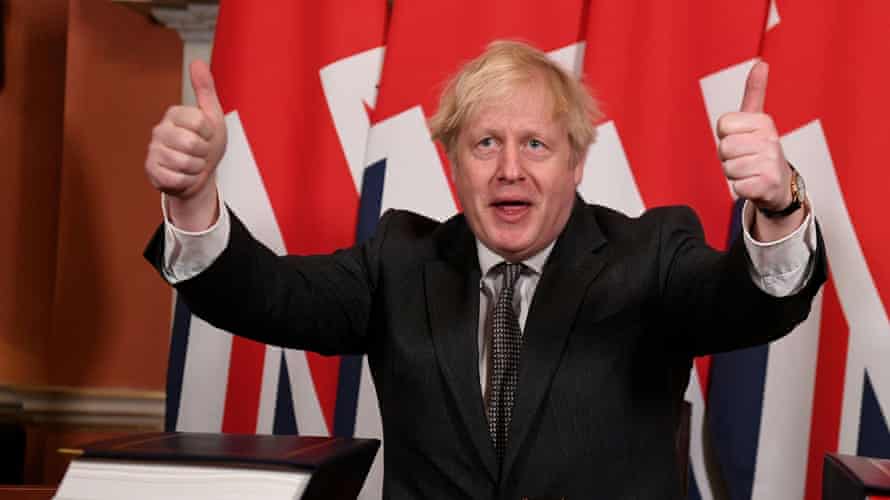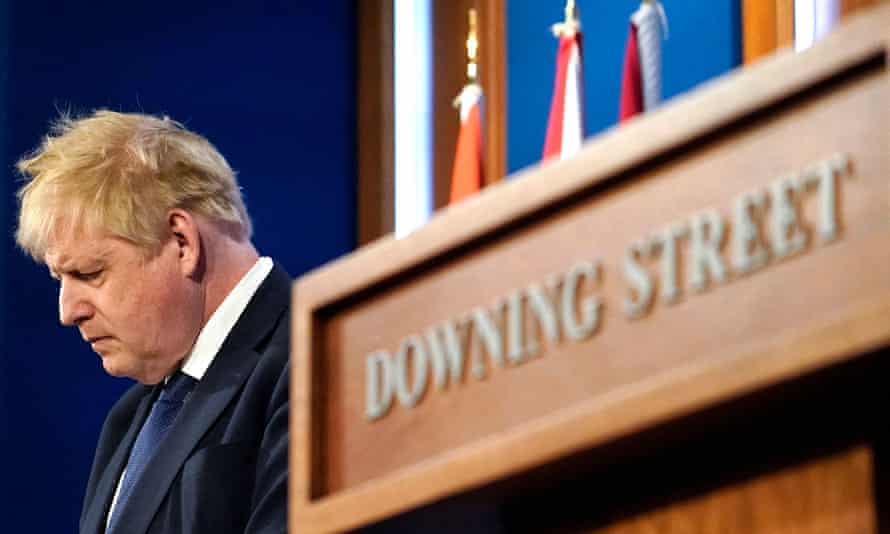Lies and a brazen contempt for the rules powered his rise; lies and a brazen contempt for the rules brought his fall. Which means the political odyssey of Boris Johnson has a curious symmetry. Except that what began as defects in the personality of one man ended as defects in his party and his government, inflicting great damage on the entire country.
The lies that proved his undoing are now all too familiar. The last, fatal lie was his claim that he had not been told directly of complaints of sexual misconduct committed by the former deputy chief whip Chris Pincher, a claim rapidly exposed as false in a rare intervention from a former permanent secretary at the Foreign Office, Simon McDonald. It turned out that Johnson had indeed been briefed about Pincher, and that once again Johnson had not told the truth.
But though that newest dishonesty was the last straw first for Sajid Javid, then minutes later for Rishi Sunak, and, over the dizzying 36 hours that followed, dozens of others, triggering a wave of resignations and withdrawals of backbench support that ultimately brought Johnson’s removal, it was hardly what broke the Johnson premiership.
Instead it was the pattern of repeated mendacity that proved too much to bear both for Johnson’s previous chancellor and his hastily installed successor, his health secretary and a slew of more junior colleagues, a pattern so firmly established in the public mind that even his closest lieutenants could deny it no longer. Central to it, of course, is the scandal known as Partygate.
Johnson had stood before the country in one of the darkest hours of the postwar era and promised that we were all in this together, that the lockdown regulations that kept loved ones from each other, even as they drew their last breath, applied to everyone including him.
But, as the nation discovered nearly two years later, that was not true. He broke those rules, indeed he broke the law and “presided over a culture of casual law-breaking”, in the words of an earlier resigner, the former minister and one-time ally Jesse Norman, even in the very building where those laws were drawn up, seeing himself as “free of the network of obligation which binds everyone else”, to quote the Eton housemaster who had spotted that same trait in Johnson 40 years earlier. He lied again when he told parliament he was shocked and “sickened” to discover parties had taken place in Downing Street, when he knew all too well they had taken place because he attended those parties himself.
Dishonesty and deceit
None of this was a surprise, because dishonesty has been the one constant through Johnson’s career. Famously, he was sacked from his first job, at the Times, for making up a quote, and later he was sacked from Michael Howard’s frontbench for lying to the then party leader about an affair.
Ordinarily, a reputation for serial deceit would close off the route to the top, or at least prove an impediment. Yet for Johnson it proved no obstacle at all. On the contrary, his route to No 10 was smoothed with lies. How come? What were the forces that propelled a man whose flaws were so clear and well documented into the most powerful job in the land?
At its most superficial, Johnson was lucky in his opponents. Leaders often emerge as chemical reactions to their predecessors: after Barack Obama, Donald Trump. Johnson was blessed to seek the Tory crown after the resignation of Theresa May.
Bored with a leader who was dutiful, diligent and deathly dull – whose wickedest youthful transgression had been running unauthorised through a field of wheat – Conservatives were ready for someone with some swash to his buckle.
That was bound to be Johnson. For more than two decades, ever since he had stolen the show on Have I Got News for You, Johnson had been the Tories’ guilty pleasure. They would mob him at party conference, giggling at his every scripted gag, delighting in every studied ruffling of the hair.
For years, the conventional wisdom had held that “Boris” was the obvious choice for jester but an improbable king. But after May, under whom the Tories won just 9% of the vote in the 2019 elections for the European parliament, they were ready to overlook all the obvious flaws and offer the throne to her polar opposite.
The political logic was straightforward. For all his defects, Johnson was hailed as the Heineken candidate, able to woo parts of the electorate other Conservatives could not reach. Had he not proved that in London, becoming mayor – twice – of an otherwise Labour city? Conservative MPs, even those who knew Johnson best and therefore disliked him most, elected him leader on that basis.
Apparent vindication came within six months, in December 2019, when Johnson bagged the Tories an 80-seat majority, their biggest win since 1987. His smashing of the “red wall”, after a campaign in which voters in traditional Labour seats jostled for selfies with Johnson, seemed to prove he really could refresh parts of the country beyond the reach of his rivals.
In fact, there was no Heineken effect. Polling data showed that Johnson was less popular at the last election than May had been in 2017. He had an approval rating of minus 20 (May’s had been minus seven). According to the election analyst Peter Kellner, “Johnson’s victory in 2019 owed less to his popularity than Jeremy Corbyn’s unpopularity.”
For while Johnson scored minus 20, Corbyn stood at minus 44 (24% satisfied, 68% dissatisfied). As so often, Johnson had proved lucky in his opponent. In London, he had twice run against Ken Livingstone. In 2019, he found himself for a third time in just over a decade facing a far-left candidate on whom public opinion had soured. In all three cases, Johnson did not need to be especially popular to win.
‘Getting Brexit Done’
Which brings us to Brexit. On one reading, Johnson’s accession to Downing Street was foretold on 23 June 2016. Once the country had voted to leave the European Union, it was surely only a matter of time before a leaver led the country – and not just any leaver but the man who had made himself the face of the Brexit campaign.

In this view, the May premiership was no more than a three-year interregnum, a diversion from the path sketched out by fate, the detour created by the split in the leave camp triggered by Michael Gove’s last-minute repudiation of Johnson, when Gove declared that his former comrade-in-arms could not “provide the leadership” the country required (a betrayal for which Johnson exacted long-delayed revenge on Wednesday night, sacking Gove and having his aides brand him “a snake”). Remainer May did her best, trying to mollify the Brexiters in her party, but it was always a doomed effort, especially once she lost her Commons majority in 2017. The coming of Mr Leave was an inevitability.
Once installed in No 10, and thanks to a strategy devised by Dominic Cummings, Johnson deployed Brexit to engineer an election in which he would win his own mandate.
Faced with a deadlocked Commons, Johnson resorted to ever more outrageous moves – illegally suspending parliament, expelling 21 Tory MPs who had defied him – which, Cummings would later admit, were designed to drive remainers crazy. (As Cummings saw it, remainers duly played the role he had scripted for them, as elitists bent on thwarting the popular will.)
By the end of 2019, Johnson could go to the country casting himself as the only man who could end the stalemate and, at last, “get Brexit done”. It worked.
But a bogged-down Brexit, a charisma-free predecessor and unpopular Labour opponent were only the most visible forces at work in the rise of Boris Johnson. What also eased his ascent was a subtle but powerful shift.
It took its most florid form in the US, with the election of Trump – along with Brexit, the other great shock of 2016. Put simply, it was the arrival of a new variant of populist politics, one that carried a strain of celebrity culture. Trump had been a bigger star than Johnson – he had his own TV show, The Apprentice, while Johnson mainly had to make do with the odd panel appearance – but their appeal worked in similar ways.

Humour was central to it, not to entertain so much as to signal that the performer was different from all the other stuffed-shirt politicians. That had been Johnson’s shtick for years: the messy hair, the untucked shirt, the apparently ad-libbed – though usually meticulously crafted – remark. In his case, it almost certainly began as an attention-catching strategy, a way of standing out from the crowd, whether at Eton – turning a failure to learn his lines for a school production of Richard II into slapstick comedy – or when seeking the top job at the Oxford Union.
But by the time of the EU referendum the shtick had turned into something else. It had acquired a political meaning, a way of signalling that he stood outside the usual conventions, that he was a maverick unafraid to break the rules. In 2016, it became part of a politics that sought to harness the energy of anti-politics, Johnson presenting himself as the fearless challenger to the Westminster consensus. Even – however improbably for a man of his resume – as the anti-establishment tribune of the people.
Britain’s Trump
It was quite a transformation from the liberal, vaguely cosmopolitan persona Johnson had constructed as mayor of London, a reinvention comparable to Trump’s jettisoning of his past as a New York, pro-abortion-rights Democrat.
But by the end of 2016, both men had repositioned themselves as the embodiment of nationalist populism, railing against liberal elites and promising to restore a vanished past, whether it was to Make America Great Again or to Take Back Control.
The dishonesty was still there, distilled into the £350m figure on the side of Vote Leave’s red bus, with its false claim that Britain was sending that sum to the EU. Of course, lies about Europe were how Johnson had made his name back in the 1990s, as the Telegraph’s correspondent in Brussels, from where he churned out a series of eyecatching fictions, from an EU attempt to straighten bananas to an imagined Italian request for EU approval of smaller condoms. Those years spent confirming Telegraph readers’ prejudices, as well as their worst fears of an imminent European superstate, helped strengthen British Euroscepticism and rolled the pitch for 2016.
Now, though, Johnson’s habitual mendacity was embedded in a larger political project, one that went far beyond Britain. “Post-truth” was one of the defining features of the new populism, often allied to a contempt for science, data and expertise.
So naturally Vote Leave waved aside the stats about economic self-harm, including those that spelled out how a Britain that removed itself from a single market of its closest neighbours would obviously end up poorer. If anyone who knew about trade raised an objection, they were told the country had “had enough of experts”.
For this form of populism Boris Johnson was a perfect fit. His personal brand had long been a breezy disdain for the worker bees and “girly swots” who felt duty-bound to go through their papers, to read their briefs and master the details. He had long been a familiar English archetype, the gentleman amateur offering fluency, confidence and swagger in place of effort, experience and attention to detail, and Brexit-era populism lent what had been mere character flaws – arrogance and laziness – a patina of ideological intent.
In the age of Trump and Brexit, to be a congenital bullshit artist – as Johnson always had been – was to define yourself as a man of “the people” and their “instincts”, unrestrained by pettifogging niceties, heedless of the boring naysayers and their tedious facts, ready instead to take a stand against the know-all elites, establishment and experts. In that respect at least, the US president was not wrong when he recognised in Johnson a kindred spirit, “Britain Trump”.

It might even have worked, for a while at any rate. But then came coronavirus. Populists have no answer to a pandemic, for it requires the very things Johnson and his ilk lack and despise: hard work, a forensic grasp of detail, the wisdom of experts, human empathy, a spirit of self-sacrifice and, above all, rules. Of course, he would not follow them. He never had. It had once been part of his appeal.
But with the revelations of lockdown partying in Downing Street, that same trait prompted public revulsion. The Sue Gray report, even long-delayed and reportedly diluted, with its accounts of round-the-clock partying, drunken brawls, wine-spattered walls and vomit – along with a Bullingdon Club contempt for the servants – brought a fresh wave of collective disgust. From that point on he was living on borrowed time. If it had not been the Pincher affair, it would have been something else.
In the end, Johnson, who had dreamed of a decade in Downing Street, will have occupied No 10 for a little over three years. (That’s if he gets his wish to stay until the autumn; if he is ejected sooner, he will fall short of that milestone and have been an even shorter-lived PM than May, a fact that will sting.)
But that still gave him time to do some lasting damage. Not just a mishandling of the pandemic that meant that at one stage Britain had recorded the highest death toll in Europe and the greatest economic blow in the G7, but something less measurable.
Sign up to First Edition, our free daily newsletter – every weekday morning at 7am BST
He turned the Tory party away from the values it once held dear, so that Johnson’s party cheerfully jeopardised the union, tramped on parliamentary sovereignty and even insulted the monarchy. He purged it of some of its best people and debased several of the great offices of state by filling them with obvious incompetents. Above all, he drained what remained of the public reservoir of trust.
In the spring of 2020, Britons were ready to follow their prime minister into a long period of collective self-discipline, even at the expense of hardship and emotional pain. They did it because they believed him when he said we would all be doing it, every last one of us. The Queen believed it, which is why she sat alone as she buried her husband of 73 years. But it was not true.
That will leave its own legacy, in distrust and cynicism that will endure long after Boris Johnson leaves Downing Street, his brief but toxic spell in the office he craved since childhood finally over.
www.theguardian.com
George is Digismak’s reported cum editor with 13 years of experience in Journalism